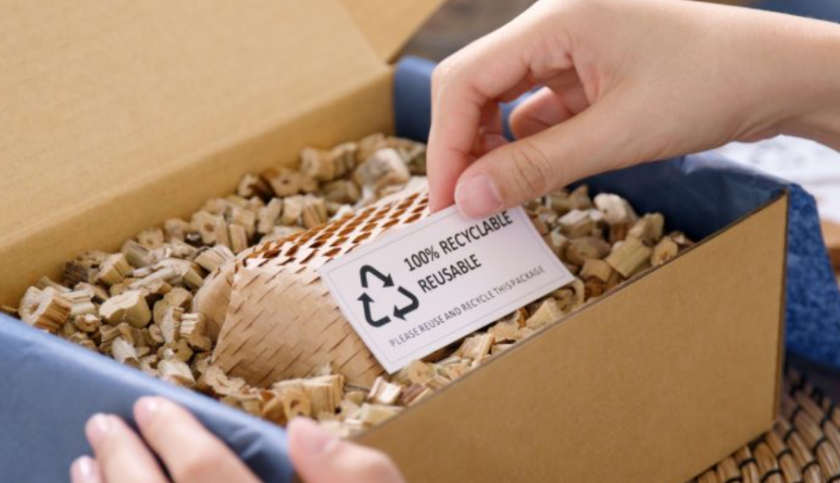Gemline, Lawrence, MA, has added carbon footprint data to more than 100 of its products as part of its ongoing sustainability and transparency efforts.
The company said it has spent the last year preparing for the initiative, working with a global leader in impact measurement technology to calculate the greenhouse gas emissions (GHG) for a variety of items in its lineup. Gemline said it’s tracking the “cradle to gate” emissions of products – from the raw-material stage through distribution to Gemline. Product lifecycle analyses (LCAs) are often measured from “cradle to grave” – incorporating into calculations the consumer use and how a product is discarded, recycled or upcycled at the end of use.
“Cradle to gate is where most companies begin on this journey, and it is considered to be a best-practice approach,” Tim Behling, vice president of supply chain and sustainability, told ASI Media. “As we continue to develop this process and more circular solutions, we will review taking the next step to cradle to grave in the future.”
Behling added that the complexity of Gemline’s distribution methods, with goods being transported via a variety of methods to various locations, whether secondary warehouses or direct to consumer, was another reason the supplier decided to focus on cradle to gate for its initial carbon calculations.
The emissions tracking, measured in kilograms of CO2, is prominently displayed on the product pages of more than 100 of the supplier’s top-selling items on gemline.com. For example, the RuMe recycled medium tote (101854) has a footprint of .36 kilograms of CO2, and the Acadia Sling Cooler (101607), made of rPET and recycled foam with a PEVA lining, has a footprint of 1.73 kilograms of CO2. For context, Gemline notes on its website that 1 kilogram of CO2 is equivalent to using a low-energy lightbulb for 33 days, driving an average gas-powered vehicle for 2.6 miles or charging an average smartphone 122 times.
As summer progresses, Gemline said it plans to “more than double” the count of products that share carbon-footprint data. The ultimate goal, according to the supplier, is to extend this transparency to all of its products in the near future.
Gemline said the product-level carbon tracking is part of its efforts to manage Scope 3 emissions. Providing the carbon emissions data not only provides transparency to customers so they can make more informed buying decisions, but the supplier will also use it to guide future efforts “to minimize carbon emissions throughout the product lifecycle,” the company noted on its website.
“Quantifying and communicating the carbon impact of our products is a critical step towards achieving greater transparency in our industry and helping all of us better understand and eventually reduce our Scope 3 emissions,” said Frank Carpenito, CEO and president of Gemline and a member of Counselor’s Power 50 list of the most influential people in promo. “This initiative not only reflects our commitment to reducing our carbon footprint, but supports our betterway corporate social responsibility goals of bettering people, planet and product.”
Scope 3 emissions are generally considered the most difficult to measure and reduce. Scope 1 are direct GHG emissions that come from sources controlled or owned by an organization, like company vehicles and equipment. Scope 2 emissions are associated with the purchase of electricity, heating and cooling. For most companies, the vast majority of environmental impact comes from Scope 3 emissions – a sort of catchall category that includes indirect emissions that occur up and down a product’s value chain and also includes everything from business travel and employee commuting to the processing, use, distribution and disposal of goods.
The largest portion of Gemline’s Scope 3 emissions are “purchased goods and services,” Behling told ASI Media.
“By calculating the carbon footprint at the item level, we will be able to estimate our potential Scope 3 emissions and then build a future plan around mitigating and managing this number down,” Behling added. “Too many companies make a carbon-neutral claim – for example, going carbon-free by 2030 – before they even know the number. We want to know the number first, so we can build a plan around managing it.”
Very few suppliers in the promo products industry are tracking and publishing product-level emissions. Dutch supplier XD Connects spent two years developing an independently verified LCA tool that calculates the cradle to grave emissions of its products – from raw material extraction to consumer use and end-of-life considerations. Rupt (asi/84203), launched at the beginning of the year, also publishes CO2 emissions for its products. And last year, Italy’s Atlantis Headwear (asi/37380) shared LCAs for select styles as part of its carbon-footprint reduction efforts.
Publishing carbon-footprint data is the latest of many sustainability initiatives from Gemline. In May, the supplier reincorporated as a Massachusetts Public Benefit Corporation, codifying its intention to consider social and environmental concerns along with fiduciary responsibilities. The supplier also offers several products that incorporate Aware traceability technology, allowing people to scan a QR code on hangtags to follow the entire journey of the sustainable components used in products.
Founded in 1958, Gemline ranked 12th on Counselor’s most recent list of the largest suppliers in the industry, with reported 2022 North American promotional products revenue of $151 million. The firm has a bronze rating from EcoVadis, and noted in its most recent betterway CSR report that it donated more than $973,000 to charitable causes in 2023, including national partnerships with the Boys & Girls Clubs of America and One Tree Planted.


